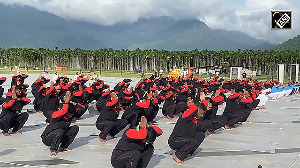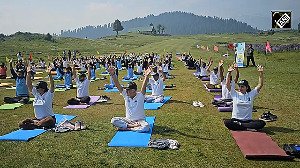The United States military is asking President Barack Obama to maintain the 33,000 troop surge force in Afghanistan until the fall of 2012 to keep a large portion of the extra personnel in the country through the next two heavy fighting seasons, a media report said on Friday.
The extra 33,000 US troops were pumped into Afghanistan as part of a surge ordered by Obama in 2009, and the US deadline to begin troop withdrawal from Afghanistan begins in July. A decision on ending the surge is expected in June.
However, the military wants to avoid a situation in which large number of troops are pulled out during the heaviest period of militant activity next year -- the warm months -- just as it hopes to be focusing on violent eastern provinces bordering Pakistan, The Wall Street Journal said.
The Pentagon is therefore asking the administration to hold off ending the surge by the fall of next year, it said.
The plan would also allow Obama to offer a war-weary electorate a substantial troop withdrawal around the same time he is asking for another four years in office, it said.
Military officials say the November 2012 presidential election schedule has nothing to do with their recommendations, though they acknowledge that political considerations could affect Obama's decision. They say their only consideration is to maximise the pressure on the Taliban.
Unnamed military and administration officials were quoted as saying that it is unclear whether Obama will go along with the recommendation, or order a faster or slower withdrawal than the military seeks.
Obama has called for a significant withdrawal in July but has not said publicly what that would entail or when he expects the full 33,000 troop surge to end.
"That conversation will continue," White House press secretary Jay Carney said
The US military has nearly 100,000 troops in Afghanistan, including the surge forces. The US plans to leave only a "small fraction" of the total number after December
2014, when the Afghans are scheduled to take over full security responsibility, outgoing Defense Secretary Robert Gates said.
The daily quoting administration officials said Gates and the top commander in Afghanistan, General David Petraeus, started detailed discussions with Obama this week over how many troops to begin withdrawing from Afghanistan in July.
Military leaders have been wary of publicly voicing their drawdown recommendations for fear of antagonising White House officials, some of whom have accused commanders of trying to box in the President on earlier troop decisions, it said.
Gates, in his final month as defence secretary, made clear his preference for a slow drawdown, a view shared by many commanders in the field.
In private talks with lawmakers and other officials in recent weeks, Gates and Petraeus said they favoured maintaining as much combat power in Afghanistan as possible through the 2012 fighting season, reflecting the need to hold on to what military officials see as solid, but reversible, gains in the south while intensifying operations in the east, the daily said.
Taliban and other insurgents often pull back to sanctuaries in Pakistan during the snowy winter months.
In recent weeks, officials said they anticipated an initial withdrawal of between 3,000 and 5,000 troops in July, followed by a drawdown of as many as 5,000 more troops in the fall.
A senior US official who favours a slow drawdown said Obama's decision on when to complete the withdrawal of the remaining surge troops was far more important than his decision about July's initial drawdown.








